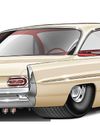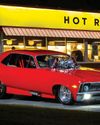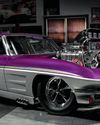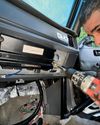
Sources
Joe Gibbs Racing: joegibbsracing.com
Total Seal: 632.587.7400; totalseal.com
Heat is a byproduct of combustion. Both air-cooled and water-cooled engines need to dissipate that heat to keep the engine from running too hot. Can piston rings play a role in managing that heat? Before we get into the details on that, we need to talk about another significant source of heat in an engine: friction.
Heat is also a byproduct of friction. Think about rubbing your hands together to warm them up. The faster you rub your hands together, the warmer they get. Now think about the pistons in your engine-they're moving faster than 200 cycles per second. That's why piston rings matter when it comes to engine temperature.
The primary source of friction-related heat in an engine is from the piston rings rubbing against the cylinder wall. Multiple research studies from Ford and the U.S. Department of Energy have concluded that the piston ring and cylinder wall account for as much as 40% of all engine friction. No wonder today's OEM engines have thinner piston rings than their predecessors. Think about a 1972 Camaro and its 350ci small-block, which had a piston ring pack with two 5/64-inch rings and a 3/16-inch ring. Now think about the LS7, with two 1.2mm rings and a 3.0mm ring-that's a 40% reduction in overall ring thickness!
Ring Thickness vs. Engine Heat
This story is from the {{IssueName}} edition of {{MagazineName}}.
Start your 7-day Magzter GOLD free trial to access thousands of curated premium stories, and 9,000+ magazines and newspapers.
Already a subscriber ? Sign In
This story is from the {{IssueName}} edition of {{MagazineName}}.
Start your 7-day Magzter GOLD free trial to access thousands of curated premium stories, and 9,000+ magazines and newspapers.
Already a subscriber? Sign In

What Is Pro Street?
You know it when you see it.

Pro Street in Pure Vision
Builder Steve Strope weighs in on the Pro Street look and what he would build today.

THE GAS ERA LIVES ON
These vintage race cars chart the evolution of technology in the early days of drag racing.

MOTOR HEAD FOR LIFE
Scott Sullivan is one of the original Pro Street pioneers. He still builds cars today out of a small shop in Dayton, Ohio.

BRINGING BACK PRO STREET!
David Freiburger and Roadkill Garage built a Pro Street Nova.

SWEET ASPIRATIONS
Jerry and Matthew Sweet added an 800ci Pro Stock mountain motor to chase HOT ROD Drag Week's Pro Street NA Record.

Making Bad Decisions Badder
Bradley Gray's 1970 Nova is a Hybrid! It's a streetable Funny Car.

ART PROJECT
This Rad Rides by Troy-built '63 split-window Corvette went from restaurant prop to ripping up the street!

WHERE DO WE GO FROM HERE?
THE PRO STREET ERA PEAKED IN THE '80S. ARE WE IN THE BEGINNING OF A RESURGENCE?

Making Connections
Project T-top Coupe: We install a Terminator X Max for big power.